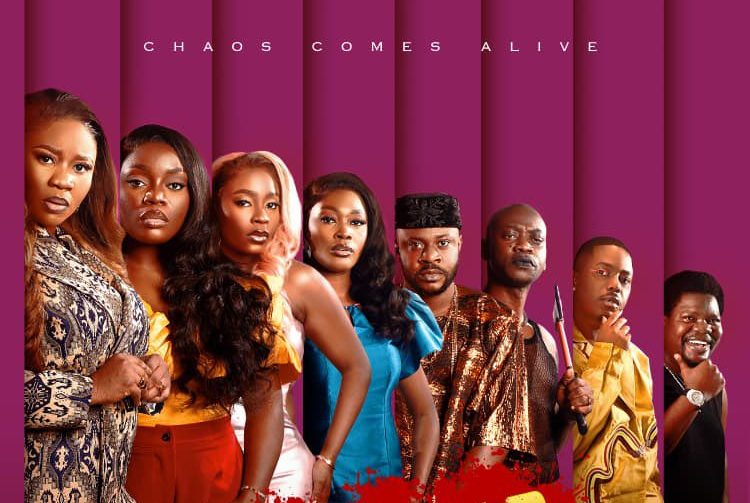Gingerrr is yet another loud Nollywood blockbuster that dies on the altar of excess and spectacle—a movie that could have greatly benefitted from a firm hand and a healthy dose of restraint.
By Vivian Nneka Nwajiaku
Nearly six years have gone by since Kayode Kasum’s Sugar Rush (2019) hit the screens. Today, it remains one of New Nollywood’s most memorable comedies. Sugar Rush was by no means a perfect film. It was overly chaotic, far from well-written, and suffered from the great Nollywood third act curse. But it truly offered a sugar rush. What it achieved as a Nollywood comedy is what Gingerrr (2025), intentionally or coincidentally, seems eager to achieve.
Directed by Yemi Filmboy Morafa (The Wait (2021); Sin (2025)), written by Xavier Ighorodje (Foreigner’s God (2022)), and a production collaboration between the film’s main cast, Bukunmi “KieKie” Adeaga-Ilori, Bisola Aiyeola, Bolaji Ogunmola, and Wumi Toriola, as well as Nollywood producer Ope Ajayi (Ada Omo Daddy (2023); Queen Lateefah (2024)), Gingerrr is indeed reminiscent of Sugar Rush in more ways than one.
The title is an obvious similarity—both films reference condiments that have become synonymous with energy, which, in turn, is a major feature of both films. That they are both star-studded ensemble movies is another common factor, made more recognisable by Bisola Aiyeola’s appearance among the main cast in both films and Lateef Adedimeji in supporting roles. And the ensemble cast itself being dominated by women is yet another shared characteristic.

While the plot unfolds differently, they both combine action, crime thriller, drama, and comedy. Plus, the premise is basically the same thing, with distinctions that are primarily a matter of number and nature. In Sugar Rush, the Sugar sisters are three blood sisters who get caught in the world of crime when they stumble upon a bag of foreign currency. In Gingerrr, the Gingerrr sisters are four childhood friends who reconnect and get caught in the world of crime when one of them unexpectedly inherits a box of gold.
The newly wealthy friend is Omotola “Lala”, played by Bukunmi Adeaga-Ilori, a modest but sharp-mouthed young woman who is forced to relocate with her grieving mother (Fathia Williams Balogun) to Lagos, where her late, estranged father has left a house for them, as well as the gold, under the care of his literal partner-in-crime, Ade Shine (Odunlade Adekola), and his lawyer, Barrister Sukanmi (Toyin Oshinaike).
In Lagos, Omotola has to contend with her father’s antagonistic first wife, Remy Blaq (Shaffy Bello), and their spoiled son, Golden Boy (Timini Egbuson), both of whom harbour intense hatred for her and her mother and see no reason why the secret second family should share in the gold. Omotola also has to deal with a maniacal, Bible-quoting criminal businessman, Abula (Blossom Chukwujekwu), who wants the gold. Even Ade Shine, whom she is supposed to trust, seems interested in a piece of the pie.
In another film, any of these people would easily take the gold before Omotola could claim it. After all, they are all familiar with criminality in a way that she is not. But Gingerrr creatively introduces a catch: Baba Goldy has fortified the box of gold with traditional charms, and Omotola is one of only two people who can access the gold, the other having already failed at retrieving it.
To outscheme everyone else and steal what should ordinarily belong to her, Omotola has to rely on her old friends—Sylvia, Bulgari, and Alabokun, played respectively by Bisola Aiyeola, Bolaji Ogunmola, and Wumi Toriola. Together, they set out to pull off a heist that ends in a third-act mayhem that is even more chaotic and illogical (even in the world of the film) than all the pandemonium that precedes it.
Meanwhile, the old friends have their own problems. Sylvia is the pretentious “life of the party” who has been diagnosed with a terminal illness. Bulgari is a sex worker who, along with her aspiring-musician boyfriend, Martell (Debo “Mr. Macaroni” Adedayo), owes Ade Shine an incredulous amount of money. And Alabokun is a herb seller who runs a home in the slum where she tries to keep youngsters safe.
If the plot seems bloated, that’s because it is. And unfortunately, Gingerrr proves entirely incapable of keeping its many plot points coherent or its characters grounded. Nor is it able to balance its genres. The film does land a few laughs, and it toys with some interesting, albeit overplayed, dramatic choices, like the supernatural hurdle surrounding the box of gold, and the use of prescience in the will-reading scene. But it suffers from tonal confusion and a poor blend of its elements of action, thriller, drama, and comedy.

The screenplay strives for style, dividing the story into parts whose titles feel more contrived than thematic, conveniently aligned with the film’s strained attempt at cultural symbolism. And though this segmentation should have aided the narrative structure, the writing is utterly devoid of order and further weighed down by inconsistent pacing and superfluous subplots. In Gingerrr, not even the film’s centrepieces—the relationship between the friends and the cultural significance around the box of gold—are properly explored.
Really, Gingerrr is overrun with activity, but most of it is dramatically inconsequential. Practically every character (and there are simply too many of them) is introduced in the most unnecessarily stagy way. Actions are overexaggerated. Motivations are vague and often upended by desperate plot twists in service of the shock factor. The dialogue is tedious. Even technical choices are sometimes overdramatic, from odd Dutch angles to choppy editing. And for all the star power, the majority of the performances in this film are forceful, cringey, or both.
Gingerrr is yet another loud Nollywood blockbuster that dies on the altar of excess and spectacle—a movie that could have greatly benefitted from a firm hand and a healthy dose of restraint. Running for two hours and an extra half (approximately), it spends most of that time throwing everything at the wall in the hope that something sticks. Yet, unlike Sugar Rush, very little is to be remembered by the time the credits roll.
Rating: 1.5/5
(Gingerrr premiered in Nigerian cinemas on 26th September 2025.)
Vivian Nneka Nwajiaku is a writer, film critic, TV lover, and occasional storyteller writing from Lagos. She has a master’s degree in law but spends most of her time reading about and discussing films and TV shows. She’s particularly concerned about what art has to say about society’s relationship with women. Connect with her on Twitter @Nneka_Viv



